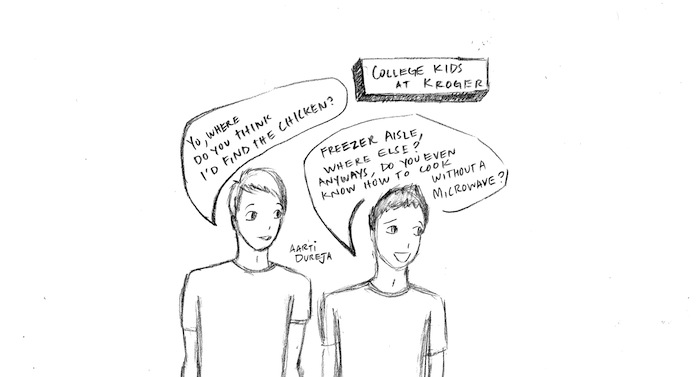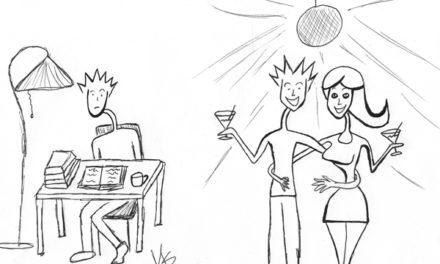Trigger Warning: Sexual Assault
This summer I discovered almond milk.
I suppose I’d already found it, in the sense that I knew it existed, but a roommate that invariably brought the stuff back on her weekly grocery runs piqued my curiosity.
“Only 30 calories!” the labels claimed. I furrowed my brow.
When I buy food I calculate the total number of calories divided by the price, always trying to maximize the calories per dollar ratio. Growing up in Uzbekistan, I had neighbors with more kids than potatoes to feed them with. The fact that a company might have the audacity to advertise its product as basically water put me in a ponderous state of mind.
I realized something this summer. We – Americans, westerners, whatever you want to call us – do food backwards. We do food selfishly. We are all about the latest diet, staying slim, eating great-tasting food that’s not too fattening. The center of attention is our own bodies and how the food will affect us, and our gaze rarely widens enough to encompass the web of production we enter through consumption.
Working on a Mennonite farm over the summer exposed me to Anabaptist theology (think Amish). The premise is simple: you are responsible for your every action; moreover, you are responsible for the full effect of your every action. One reason the Amish live in separated communities involves keeping the full chain of cause and effect confined within their colonies. If they tap into the local power lines, they find themselves responsible for the coal burnt in power generators, the coal’s extraction and production, including the machines involved and their sources in turn, the workers and their plight, the environmental effects, and so on. Instead of facing this mess of effect and consequence, then, they are able to avoid it.
I maintain that the Anabaptist outlook on life is less abstractly theological than plain common sense.
When I buy meat at the local grocery store, my action is more complicated than one might first suspect. I am not merely responsible for supporting the store and the brand of meat. I have been implicated in a chain of production with unfathomably deep roots. I am suddenly responsible for an animal’s untimely and likely violent demise. I am likewise perpetuating the production of grain to continue feeding that animal’s kin, in turn exacerbating the destruction of South American rain forests leveled to keep up the demand.
The fact is, while there are those who still go to bed hungry in this country, we grow enough grain to feed the U.S. population over two times over – and feed it to our livestock. The amount of water and energy expended into bovine products is lavish to say the least. It’s simple biology: trophic levels. Imagine sitting down a meal of corn. You pile your plate high and gorge yourself. No matter how stuffed you are at the end of your meal, you’ll be hungry again in a few hours. Now think of a cow. He eats corn too. He’s a huge and hungry animal, and needs several times more than you do. He eats this much corn for years, until he’s finally fat enough for the slaughter. Now you sit down to a juicy steak dinner. But you’re not eating an eight or twelve ounce hunk of cow; you’re consuming the mountain of corn that it took to feed that cow over a lifetime – except for you its just one meal.
That’s an optimistic picture, if you can believe it. Many farms feed their cows expired candy. It induces diabetes, making the cows sick and obese – their meat tenderer.
And that’s just the animals. Thousands of immigrant workers pick fruits and vegetables for pennies. Many of the female laborers have been raped, threatened with losing their job if they did not comply. Dangerous pesticides and a lack of protection wreak havoc on their bodies. The hours are long and the pay is paltry. The story is not too different for the meat and other industries, all to ensure that the Jr. Whopper stays on the Dollar Menu.
The tragedy is not even so much the foods’ production, but the fact that Americans end up throwing out 40 percent of this questionably obtained sustenance, while millions starve worldwide – and indeed, in the United States itself, where one in six are said to struggle to get enough to eat. Just sit and watch the DUC disposal belt, where trays of uneaten hamburgers, whole sandwiches and uneaten fruit are chucked without a second thought.
It’s one thing if you raise a chicken with table scraps and eat it for Thanksgiving. It’s another thing if you take someone else’s cow, grown at unimaginable expense, and throw it in the garbage.
Simply put, we have lost the glory of the medieval worldview, the worldview still maintained in many non-Western cultures. Somewhere along the line, humanism and homo mensura (or “man as the measure”) eclipsed a more cosmic perspective on life, a vision of community that is more than the sum of its parts. Individualism triumphed at the expense of communities.
In our bodies, our cells undergo programmed death in the advent of mutations that could lead to cancer, an unflinching sacrifice for the good of its integrating organism. Our culture, however, has become myopic, losing sight of the ecological whole, forgetting that our purpose concerns not only ourselves, but ultimately our species and our world. We are small piece of the machine, a fleeting breathe of wind in a global weather pattern, far, far from the eye and epicenter of it all.
– Jonathan Warkentine is a College junior from Almaty, Kazakhstan.
The Emory Wheel was founded in 1919 and is currently the only independent, student-run newspaper of Emory University. The Wheel publishes weekly on Wednesdays during the academic year, except during University holidays and scheduled publication intermissions.
The Wheel is financially and editorially independent from the University. All of its content is generated by the Wheel’s more than 100 student staff members and contributing writers, and its printing costs are covered by profits from self-generated advertising sales.






